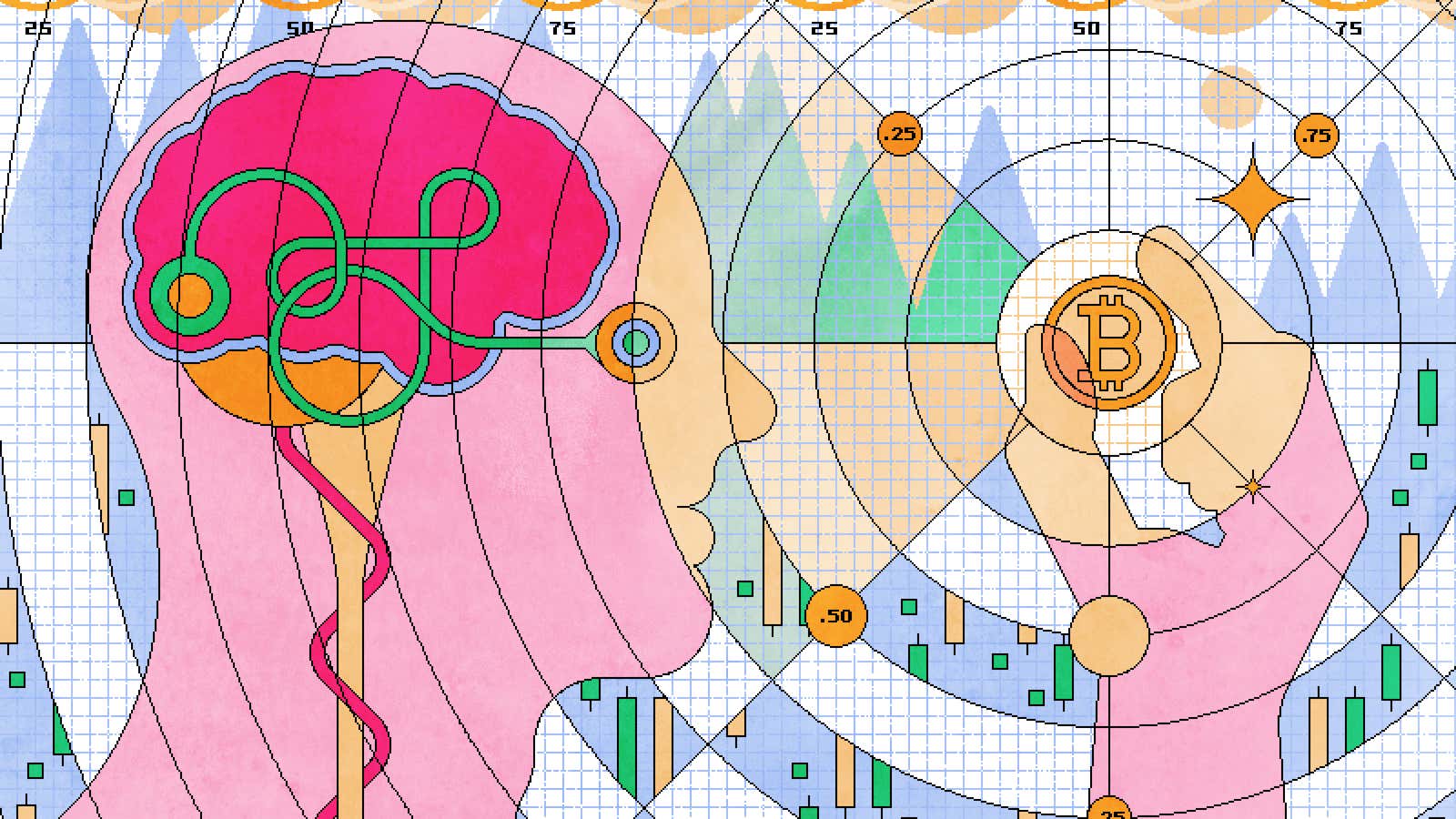When the first cryptocurrencies emerged in 2009, the space felt like the Wild West—it was unregulated, it was experimental, and it took a fair amount of know-how to move through it comfortably and not get swindled. Over the ensuing decade, crypto crept towards the mainstream, slowly turning skeptics into proselytizers. By summer 2021, everything had changed. Finance, art, even whole companies were being run on the blockchain and were no longer relegated to the margins.
To get here, hundreds of people had their minds changed about the value and power of blockchain. We spoke with 12 of them to understand their “unlock moment” and where they see crypto going in the future.
Jad Esber, the founder obsessed with creators
Tyler Cowen, the economist initially turned off by crypto dogmatism
Makisa Bronson, the analyst who sees Web3 as a tool for empowerment
Kyle Weiss, the COO discovering user incentives
David Wong, the cryptographer who learned to trust the blockchain
Meral Arik and Zac Choi, the entrepreneurs who surrounded themselves with crypto proponents
Alexander Guy, the marketer who loves NFTs
Adam Samere, the engineer bullish on self sovereignty
Gail Wilson, the founder intrigued by verifiability
Noah Davis, the art broker spirited away by NFTs
Sarah Drinkwater, the community builder who saw crypto’s leftist principles
A note for readers
Beware: There’s some crypto jargon to follow. If you’re looking for a starting point, try our explainers on NFTs, DAOs, and DeFi.
Jad Esber, co-founder, Koodos

Esber is a co-founder of the Web3 company Koodos and is an affiliate at the Berkman Klein Center for Internet & Society at Harvard. He previously worked at YouTube, building tools for creators and artists.
What was your original reaction to cryptocurrencies and blockchain?
My initial reaction was this is the worst of capitalism masquerading under some variant of the common prosperity concept and NFTs are a multi-level marketing scheme for tech elites.
What changed your perspective on blockchain’s potential?
The reframing of crypto → Web3 hit home with me. Going from crypto: money is the primitive to Web3: people are the primitive. The big unlock for me was seeing past the hyper-financialized use cases today and engaging with a future where our contributions and collections are tied to us, instead of one where our contributions are the platform’s, not ours.
What projects or trends in crypto are you most excited about right now?
I’m excited about more bottom-up approaches to Web3. Web3 plays today are too top-down and archaic (throwback to initial Web1 and 2 plays). They’re all focused on partnering with IP holders (including creators) to tokenize their catalogues or create new NFTs. This is resource-intensive for both the platform (e.g. sourcing the IP/creators) and the creators. In the end, yes, creators might make some money and enter the Web3 game, although they think of NFTs as a new (more equitable) revenue channel alongside existing ones. And, yes, fans derive some value from owning their favorite creator/IP’s NFT, although minimal. Mostly, the behavior is very speculative and hyper-financial—people think of it like investing in stocks. All in all, plays that enable ‘creators to make digital merch for fans to buy’ really aren’t that fun, utilitarian, or sustainable. I’m more interested in what Web3 gaming companies are doing, and in the creator world, I’m excited about projects that focus on the fan (or curator) and getting to the creator/IP holder through them. That’s what we’re focused on at koodos.
What would you recommend our readers watch / listen to / read / follow to better understand crypto’s potential?
A few Twitter accounts here:
https://twitter.com/divine_economy
https://twitter.com/Jad_AE (disclaimer, that’s me)
Join Forefront DAO: https://forefront.market/learn
Join Kernel: https://gitcoin.co/blog/announcing-kernel/
Womxn & LGBTQ community in Web3: https://www.web3baddies.com/
Tyler Cowen, economist at George Mason University

Cowen is also the host of Conversations With Tyler podcast and blogs at Marginal Revolution.
What was your original reaction to cryptocurrencies and blockchain?
Just for a bit of background, I wrote a series of papers on monetary economics, and then a book (Explorations in the New Monetary Economics, with Randall Kroszner) which argued that technological changes were going to fundamentally revolutionize monetary institutions and finance over the next few decades. Those papers start in the mid-1980s and the book comes in the early 90s. So I was primed to see this coming, but in fact utterly failed.
I just wasn’t expecting crypto!
When bitcoin first came out, someone sent me the link and I put it on my blog Marginal Revolution—we were one of the first places to report on it.
But after that, the thing seemed to sour. It looked like a bubble. I didn’t see the use cases for bitcoin. So I became pretty crypto negative. Perhaps I was also turned off by the dogmatism shown by many crypto advocates.
What changed your perspective on blockchain’s potential?
A few things. First, in decentralized finance (DeFi) I began to see viable and important use cases. Superior returns for depositors might now drive broader crypto adoption.
Second, after a market price crash, prices came back. That suggested to me this was not just a bubble. Crypto had its chance to go away and never come back, but it didn’t.
Third, I have seen incredible energy and vitality in the crypto community. Many of the best discussions are held there, it attracts amazing talent, and the conversations are overwhelmingly positive. All big pluses and signs of a movement that is going somewhere.
I am still broadly agnostic, but now see the positive scenarios as more likely than the negative scenarios.
What projects or trends in crypto are you most excited about right now?
DeFi, or Decentralized Finance.
NFTs, not only for the art world but also as a new system of property rights for the metaverse, and as a new method of fundraising.
Use of crypto to lower the costs of sending remittances abroad to poorer countries.
What would you recommend our readers watch / listen to / read / follow to better understand crypto’s potential?
I am learning the most through conversations, meetings, and WhatsApp chatter—I am not sure how that easily can be replicated! Books and most articles on this topic are simply too out of date, even if they are factually accurate, which is not always the case. The fact that the field is moving so fast is another reason for optimism.
Makisa Bronson, analyst, Digital Currency Group

Bronson is a creative and crypto operator passionate about building innovative growth strategies for social ventures, primarily across the Web3 and consumer verticals. You can find her at www.makisa.co or at @asiancryptogirl on Twitter.
What was your original reaction to cryptocurrencies and blockchain? What were you most skeptical about?
I first learned about crypto around 2017 or 2018 (around when bitcoin first started to be quasi-mainstream and discussed in the news), but I was initially very skeptical of the concept due to my lack of familiarity with the space and its value proposition. Additionally, many mainstream news outlets’ portrayal of crypto as a suspect and illegitimate technology unfortunately deterred me from learning any more about blockchain at the time.
What changed your perspective on blockchain/crypto’s potential? Was there a specific moment or project that changed your mind?
It wasn’t until I joined tech Twitter earlier this year—and thus gained exposure to more accessible crypto- and Web3-related resources—that I really began to learn more about crypto and understand the full extent of its ability to radically improve our financial system. The more I learn about Web3 as a whole, the stronger I feel that it is perfectly suited to help solve and address many of the issues and inequities that pervade our world and global financial system. At a high level, working towards a decentralized financial system will help increase transparency and equity by capturing all stakeholders’ transactions and decisions on-chain. Furthermore, as a woman of color in the crypto space, I recognize the immense power that this technology holds and hope to 1) help other marginalized individuals enter Web3; 2) use crypto’s increased adoption as a tool for widespread economic empowerment; and 3) find innovative ways to use Web3-based solutions to further democratize our tech and financial systems.
What projects or trends in crypto are you most excited about right now?
At the moment, I am super excited by Web3 projects that aim to imagine and build bold, bright, joyful futures for all of us and that lean into the techno-optimistic nature of the crypto space. I’m particularly enamored of the work that Latashá and her team are doing to build Zora, an emergent protocol and platform for trading and curating NFTs. As an erstwhile designer, I am inspired not only by Zora’s inimitably refreshing aesthetic and brand voice but also by its mission to bring art creation and ownership back into the hands of the people.
What would you recommend our readers watch / listen to / read / follow to better understand crypto’s potential?
I would highly recommend becoming involved in crypto Twitter—it’s an incredibly welcoming gateway into what is at first a deeply foreign and unfamiliar world. I have had the privilege of meeting many passionate, kind, and incredible individuals through crypto and tech spaces on Twitter and have learned an immense amount solely from reading through the resources and knowledge that folks so generously share in this space.
Kyle Weiss, COO, Gitcoin

Weiss is the chief operating officer of the open source software platform Gitcoin. He previously worked as a senior product manager at Twitter.
What was your original reaction to cryptocurrencies and blockchain?
I first found out about Ethereum back in 2016. I was skeptical that the technology had very many real world use cases. At the time, there were mostly just speculative use cases, and then the ICO boom of 2017 brought even more “fly by night” scams forward. Programmable money back then meant smart contracts where you could escrow funds… there were lots of escrow solutions and I felt like the tech may never mature to be valuable.
What changed your perspective on blockchain’s potential?
When I worked at Twitter before joining Gitcoin, I became obsessed with the way token economics could shape not only user behavior, but how the right user incentives could unlock so much for the world in general. DeFi summer [when decentralized protocols exploded in value in 2020] was also a big financial industry unlock for me too, beyond just community building and user incentives.
What projects or trends in crypto are you most excited about right now?
I am most excited about the play-to-earn movements [in which people playing a video game win NFTs that can be converted to cash] that are happening. I feel like the next great “DeFi summer” will be when one or two games become breakout successes (Axie [Infinity] is a great example, but hasn’t quite captured the masses the way an MMORPG [massively multiplayer online role-playing game] or well done FPS [first-person shooter] seem to). I am also excited for lots of identity and reputation management solutions that are starting to come out.
What would you recommend our readers watch / listen to / read / follow to better understand crypto’s potential?
There are a couple things recently that I have enjoyed. Chris Dixon [a general partner at Andreessen Horowitz] talking about take rate really hits home for most business folks. Some of the public goods pieces are great for more liberal folks.
David Wong, cryptography engineer, O(1) Labs

Wong is a cryptography engineer at software development company O(1) Labs, working on the Mina cryptocurrency. He writes about crypto and cryptography at his blog, cryptologie.net, and was previously the security lead for Facebook’s Diem.
What was your original reaction to cryptocurrencies and blockchain?
I discovered bitcoin in college—I can’t remember exactly how and why, but it probably has something to do with silk road [an online black market]. I thought it was really interesting as it involved cryptography. After reading more about it, I bought some bitcoin and spent some on drugs. When the price started to rise, I remember checking the price on my phone constantly while in class. I ended up losing everything in the first Mt. Gox crash [Mt. Gox is a bitcoin exchange that handled more than 70% of all BTC transactions at one point. It lost $450 million worth of BTC to hackers in 2014.], but what a ride! At the time it only ever reached $500 if I remember correctly. I thought it was over after that, and recouped my loss. I didn’t think much more of bitcoin until years later when someone asked me about blockchain technology (while we were lining up at the beach in Chicago to try the new Valve VR headset). I was surprised that someone non-technical would ask about “blockchain,” a purely technical term specific to bitcoin. I really didn’t think bitcoin would grow into something bigger than just Bitcoin at the time. It was just an interesting experiment to me.
What changed your perspective on blockchain’s potential?
I think a few things. As part of my work, I audited a blockchain application that dealt with DNS [domain name system]. At the time I was mostly focusing on auditing internet protocols, things like HTTPS (SSL/TLS), certificate authorities like Let’s Encrypt, and new protocols like Certificate Transparency. They were kind of a mess, from a trust point of view, and allowed for a number of attacks. When I realized that blockchain was a way to prevent attacks, as opposed to detect attacks, I felt very compelled to understand more about other use cases than just the money one.
Learning more about payments in the world, I realized that our financial system is highly inefficient because things are too decentralized, nothing properly enforces safe movement of money, and there’s no transparency to verify that the system works as intended. In a way, cryptocurrency is a way to centralize all of that by providing a single network, or a set of interoperable networks, that are easy to connect to.
Finally, the cryptography is truly fascinating and many of the advances have unlocked applications that until now were not possible. As a cryptographer, I think it’s the most exciting field to be working in.
What projects or trends in crypto are you most excited about right now?
I’m of course extremely excited about the project I’m working on, Mina, because it is the most technical project out there. It makes use of recursive zero-knowledge proofs, a term to describe long chains of proofs compressed down to a single small proof. Basically, it solves the issue of “it takes days and terabytes to synchronize to the blockchain” by letting you verify a single small proof that can convince you that the latest state (the balances of all the accounts) was correctly computed from the genesis state (the first page of our virtual ledger). And then there are smart contracts based on zero-knowledge proofs, which is another layer of technical insanity.
Space and privacy are not the only trends I’m interested in, though. I think these are also interesting ones:
- Interoperability. I don’t think one cryptocurrency is going to win. Thus, we need to create protocols to move tokens and information between chains. Axelar is such a proposition, and it is one of the most exciting projects in the space (still in beta).
- Speed. Another interesting problem is the number of transactions per second that a cryptocurrency can process. Lately I’ve learned about consensus-less protocols that take a very different direction from all the other cryptocurrencies. See AT2 or FastPay. I’m not aware of any cryptocurrency that has implemented this yet, but these protocols seem to achieve the most insane performances, backed by actual cryptographic proofs, at the cost of not permitting smart contracts.
- Stablecoins. I’m very interested in Celo because they probably have the best product people. It is a stablecoin that is targeting mobile phones. That’s actually two problems in one. Stablecoins are interesting from a financial point of view. Disclaimer: I used to work on [Facebook’s] libra/diem, another project that is extremely interesting as is probably going to be the first crypto that will work at scale. Targeting mobile phones, the second problem Celo tries to solve, is the translation of “banking the unbanked.” To solve this, you need protocols that allow you to download small proofs for your account balance” and Celo has interesting solutions to that problem (involving zero-knowledge proofs as well).
What would you recommend our readers watch / listen to / read / follow to better understand crypto’s potential?
I’m a technical person, so I can only mention technical resources. But the Zero Knowledge podcast is top notch. I blog about cryptography and cryptocurrencies on my blog. I also have the first cryptography book (and probably the only cryptography book) with a chapter on cryptocurrencies.
Meral Arik and Zac Choi, co-founders, Passage Protocol

What was your original reaction to cryptocurrencies and blockchain?
Meral: While I was always curious about crypto and blockchain, I felt like I was late to the game. This made me feel initially intimidated by the space and so made me feel like it was not for me.
Zac: I’m a skeptical optimist and tend to be wary when something seems too dependent on hype. If you are not early you are on the wrong end of the hype, so crypto/blockchain felt exclusionary and not stable. For new markets, I try to poke holes in them until I’m convinced. I always believed in the promise of blockchain, but I was less convinced about the early use cases of crypto.
What changed your perspective on blockchain’s potential?
Meral: I was participating in Launch House [an accelerator for entrepreneurs], surrounded by founders starting crypto startups, at the time when I started diving into Web3. I started looking into blockchain and had an unlock moment that blockchain has so many use cases across so many sectors— and that this technology will make existing industries a lot more capable. One example is the ticketing industry, where blockchain can be used to prevent fraud and for suppliers to get royalties of the revenue they deserve, even on secondary sales. Today, I can’t picture myself doing anything outside Web3.
Zac: Having conversations with people who have already made the plunge changed my perspective on its potential. One of our investors from our last startup, a co-founder of a crypto exchange, mentioned that we should look at the rapid volatility cycles of crypto and blockchain as a feature, not a bug. If you follow the trendline, as an entrepreneur, it’s hard to argue [the point] that crypto has grown to a meaningful market size in a very short period of time.
What projects or trends in crypto are you most excited about right now?
Meral: I am personally excited about the growth of crypto communities such as DAOs, social tokens, and NFT communities. These communities are creating new ways of rewarding and incentivizing people— e.g. members can contribute to the community, be rewarded for their work (in tokens and/or US Dollar Coin), and share in the upside as the community continues to grow and become more valuable (similar to having equity in a company). Looking ahead, I can tell that this is going to have a significant impact on the future of work.
Zac: Universally, Web3 is still super early. DAOs and social tokens are still in the first season of their development. The idea that you can come into a sector and build infrastructure projects that solve fundamental and large opportunities and problems is very exciting.
What would you recommend our readers watch / listen to / read / follow to better understand crypto’s potential?
Meral:
- Newsletter: Forefront
- Podcasts/YouTube videos:
- Bankless
- Cryptocurrency for Beginners: With Crypto Casey (esp. episodes explaining the fundamentals, e.g. “what is blockchain” “what are NFTs”)
- Learn-by-doing:
- Try RabbitHole
- Join a DAO! You can explore some DAO’s on the Market research tab on this doc
- Article: How to Make a Cryptocurrency Wallet
Zac:
- a16z Crypto School
- Kernel program
- Surround yourself with people who are pushing themselves in the space. We are all pioneers building new products and creating a path—learning by doing and surrounding yourselves with others who are going down the Web3 rabbit hole is the best way to learn.
Alexander Guy, head of marketing, Zerion

Guy previously worked at European cloud tech provider Scaleway and digital health insurance company Alan.
What was your original reaction to cryptocurrencies and blockchain?
Initially, I saw crypto as “just another” interesting technology trend, just another piece of innovation that some really smart people were working on. I think I had that attitude for a few years.
I was naive to the potential. I couldn’t even grasp why this would be all that revolutionary or why this would be all that significant. So I think it was probably more naivete than skepticism, but it was more like, ‘Oh this is cool, it’s kind of like a branch of fintech or neobanks but it’s just one of many technologies that are emerging around this time.’ Think about where AI was five or six years ago, for example—I saw crypto as a sister or cousin of those types of technologies, as opposed to the earth-shattering, revolutionary piece of technology, which I now believe it to be.
What changed your perspective on blockchain’s potential?
Grasping digital rights, digital ownership, digital property changed things for me. NFTs specifically opened the door to a new world. I saw Sorare [an NFT-based platform for fantasy football]. It made me feel really stupid about being so skeptical of crypto and NFTs in the beginning. Anyone who collected cards as kids, whether they were like Pokemon or Magic cards that you can actually play a game with, or if they were just baseball cards or basketball cards—anyone who collects cards immediately understands scarcity and why this card is worth more than this card, even if they are with the same player.
It’s a statement about belonging, it’s a statement about hobbies, it’s a statement about myself. I think that’s one thing that inherently makes NFTs valuable and also confounds some people, because they’re like, ‘But I don’t value that thing. Why do you value that thing?’ On the blockchain this can be even more confusing as there is not a physical ‘thing’ to hold or display.
But if I’m collecting something, if I’m going through time, energy, money to be involved in this community, then it says an awful lot about what I believe in and who I am. So NFTs, in a lot of ways, get wrapped up a lot in questions of identity, of who I am in a digital space, who I am in a physical space… Somebody could take a picture of my baseball collection or my individual cards, but that doesn’t mean they have my card. It’s the same thing with NFTs.
The idea of translating those principles into a digital context became clear in my mind and from there the jump into more complex blockchain topics like DeFi and DAOs became obvious. I was hooked.
What projects or trends in crypto are you most excited about right now?
Within the NFT space, play-to-earn gaming is just so obvious. If you take Sorare, the fact that FIFA has not already built this is pretty much an indictment on them I think. It’s so obvious what Sorare has done when there’s already a huge, digital, global marketplace of exactly that. FIFA Ultimate team should be on the blockchain but Sorare built it first. There’s a huge amount of duh and no brainer-ness about play-to-earn gaming within the NFT space.
NFTs are an example of the cultural becoming financial, in some way. These distinct worlds of DeFi, NFTs, and DAOs—those three universes are converging and will increasingly operate side by side.
In the DeFi space specifically, something worth thinking about is a multi-chain experience. At Zerion right now, we’re talking a lot about chain-agnostic assets. In theory, it shouldn’t really matter to the end user. If a trade is cheaper, I’m obviously going to execute it on Polygon [a scaling solution] as opposed to layer one [“base” blockchains like Bitcoin or Ethereum, which are much harder and slower to transact on]. At the end of the day, which chain I use, which DEX [decentralized exchange] I use—all of that should be abstracted away from the end user. And that’s the world we’re working towards.
What would you recommend our readers watch / listen to / read / follow to better understand crypto’s potential?
Watch DeFi Dad’s videos, read Coingecko’s How To DeFi books, read Kei Kreutler’s A Prehistory of DAOs on Mirror, read Kris Kay (or DeFi Donut)’s Let’s Do DeFi Guide, read Coopahtroopa on Mirror. If you would like a “course-like” environment, Nat Eliason has a fantastic DeFi Orientation.
But in crypto and blockchain, there really is not a substitute for “learning by doing.”
Adam Samere, principal engineer, ShapeShift

Samere previously worked as the principal engineer at equipment manufacturer marketplace Documoto.
What was your original reaction to cryptocurrencies and blockchain? What were you most skeptical about?
I think I saw a Slashdot article or something to that effect. It was interesting and basically talking about free nerd money through mining. I distinctly remember it being interesting and then, at the same time, too good to be true. Like, ‘Come and do this and get something for free,’ which, I’ve always been a pretty firm believer that nothing is free. There’s always a catch, always something you’re unaware of, especially when there’s promises of free money in it. Ethereum I was skeptical of, for sure, because of the complexity. So I did read a little bit into it. It was tough to find much on a technical level to educate myself on it.
The thing that brought me around on that was it being out in the wild and successful and actually working. It seemed really ambitious to try and make a programmable platform off the same base technology that Bitcoin is. It basically has its one real use case hardcoded into it. Now, you’re making a platform for others to dream up future use cases and build into it. It seemed really, really ambitious at the time.
What changed your perspective on blockchain/crypto’s potential? Was there a specific moment or project that changed your mind?
I resolved it by learning, which was hard to do at the time, but came a couple of years later.
I was super bullish on the vision and the self sovereignty. Be your own bank, cut out the middleman, remove the ability of corruption to manipulate the currency and oppress people more or less. I’m a very individual liberty-minded person, right? So I tend to always pursue things of that nature.
What elements in particular changed my mind were things like the game theory. You’re pitting miners against each other in competition. At the same time, that’s elevating the security of the network and the incentives there are set up in such a way that it’s more lucrative to participate in the network than to attack it. So if you have so much computing resources, you’re better off running a miner and earning Bitcoin than trying to hack private keys or something futile like that. Also that it’s built on existing proven technology, like cryptography and torrent networks. So, Napster was the Hashcash [an early software system that inspired Bitcoin’s mining system] of today’s torrent networks, where it gave the benefits, but it required a central authority or clearinghouse to orchestrate it. That central clearinghouse goes and becomes a target.
What projects or trends in crypto are you most excited about right now?
DAOs. It’s a new way to work: shared ownership by all the contributors, and you have a community-driven governance process versus traditional top-down decision making. I think that ownership is really big in motivating people to make good decisions and do what’s ultimately best for the project, since they have a direct vested interest in it.
The other big thing I’m excited about recently is DEXes [decentralized exchanges], because it’s a way for users to transact without entrusting a centralized exchange with their funds, and hoping they don’t get hacked or decide to fly away at night or something like that. It’s a censorship-resistant way for people to trade and transact.
What would you recommend our readers watch / listen to / read / follow to better understand crypto’s potential?
Andreas Antonopoulos, Jameson Lopp, Erik Voorhees.
Gail Wilson, technical co-founder, Metaphor

At Metaphor, Wilson builds products that make it crazy easy to join and participate in decentralized communities (“DAOs”) and the Web3 world. Previously she was a software engineer at Airbnb for four years before jumping into the startup world in the middle of covid to build in the community space
What was your original reaction to cryptocurrencies and blockchain?
Originally, I was operating under the assumption that I didn’t need to know what Web3 is, nor did I want to. I was never super interested in fintech, so DeFi didn’t seem like it was necessarily for me. I had also predominantly heard about negative use cases of crypto, which likely impacted my impression.
What changed your perspective on blockchain’s potential?
There are a few different spots when things started to click and the power and importance of Web3 became clear.
The first thing that changed my point of view on Web3 was learning more about NFTs and the use cases of being able to verify something. I could see where this technology applies beyond finance. The verifiability of NFTs was intriguing.
Next, the shared database aspect of blockchain. As a blockchain user, you have access to all of the data you put into an app regardless if it shuts down. You could always build something else to access that information. It will never be lost.
What projects or trends in crypto are you most excited about right now?
I was working on a community platform before I moved into Web3 so my biggest trends are these community-focused projects, like DAOs (basically an online community with a shared bank account and shared mission). These communities are early and experimental but will unlock a lot and create equity for all of their members.
What would you recommend our readers watch / listen to / read / follow to better understand crypto’s potential?
Newsletter: The DAOly post
Actions: joining communities, Twitter following people in the space.
Podcast: On the Other Side by Chase Chapman: https://www.othersidepod.xyz/
Noah Davis, the NFT guy

Davis is an associate vice president and specialist in post-war and contemporary art at Christie’s.
What was your original reaction to cryptocurrencies and blockchain?
I was certainly ambivalent about it. I wasn’t doubting the underlying principles, I was interested in the decentralization and DIY culture. And the fact that people were building this space independently, that did excite me. But I was more focused on art and working my way up the ladder in the blue chip art world, so I didn’t have much time to focus on crypto and focus on the technology. I’m a luddite almost, especially for a young millennial. But this did all swoop me up and spirit me away.
What changed your perspective on blockchain’s potential?
Radical transparency. That is crucial, that’s the secret sauce here. The idea that all the data which is being recorded on the blockchain should be public forever and indelibly so, that was the lightbulb.
The NFT thing found me. I was the head of online sales for contemporary art at Christie’s in New York City, so I was in the right place at the right time when the NFT opportunity came to us. The expectation was to follow up the Beeple sale with something. I was doing research on the CryptoPunks, the follow up to NFTs in our sale in May; as I was poking around now on the Larva Labs site, it dawned on me that blockchain has the potential for a radical and cohesive transparency. Seeing the offers come in, seeing the wallets and their activity, being able to trace the punks from where they are now back to their origins—that blew my mind. If a site like this existed for Picasso, it would solve a lot of problems overnight. It would guarantee authenticity, keep track of exhibitions and sales—any type of transaction or piece of the story can be recorded on blockchain.
What projects or trends in crypto are you most excited about right now?
Communities. I’m excited about people finding their tribe and doing that via Web3 or blockchain-assisted internet. This kind of connectivity is really remarkable. And I am infinitely more interested in how this metaverse will get built in real time than I am about speculation, than I am about profiteering.
For me this is not an investment opportunity, it’s an opportunity to be a part of the crew that will write the rules in the future. It’s a potential gateway to a utopian future. We’re at a weird crossroads, and it could go into a nasty dystopian direction. I would hate to see what an authoritarian regime would do with a blockchain.
What would you recommend our readers watch / listen to / read / follow to better understand crypto’s potential?
Poke around on the Larva Labs site. Take a look at CryptoPunks, that amazing web of data there, in their discord too. Starting with punks is a way to good about it, that community is well established and full of brilliant people. Even though they’ve been besieged with intrigue form the outside world, there are still some people who are patient and kind. Join and listen before speaking. Getting familiar with different traits, rarities, and wallets.
I hope that people who are on the fence about this, and who are put off by some of the more toxic, big personalities that are in the space, can see beyond that and through to the builders and the really passionate people who are patient and kind and all-inclusive. There’s a lot of people like that. There’s an unfortunate connotation of bro culture around crypto, which I think is a red herring. It’s really a base that is incredibly kind and generous, more than in any space I’ve been involved in before. I’ve been involved in the art world, punk rock culture, DIY—the people in crypto and NFTs exhibit the best qualities of those communities.
Sarah Drinkwater, community builder and angel investor

Drinkwater is a community-builder and angel investor. Most recently, she originated the responsible technology team at impact investors Omidyar Network. Before that, she built and scaled the social layer on Google Maps and led Campus, Google’s East London space for startups
What was your original reaction to cryptocurrencies and blockchain? What were you most skeptical about?
Back in the early 2010s, I was running Google Campus, a startup hub in East London that welcomed a huge variety of cutting-edge technologists and founders. I first came across bitcoin, then other forms of crypto through events we hosted and the Bitcoin ATM we moved into the cafe. To be honest, some of my skepticism came from the limitations of the technology (i.e., this was pre-Ethereum and the many applications built on top of it), and some came from the crowd that naturally flocked around crypto which was very male, very young and (often) very driven by making money—it wasn’t a scene I could see myself in.
What changed your perspective on blockchain/crypto’s potential? Was there a specific moment or project that changed your mind?
I knew the scene had changed—many more protocols, products, coins launched—but, as with everything, it was people that changed my mind. I hadn’t paid attention for years, and had always associated crypto in my head with a very capitalistic right-wing crowd (libertarian sea-steaders!) but increasingly I observed creative thinkers with leftie principles make the link between the co-operatives I love and new structures like DAOs. In terms of thinkers who helped me make that link, I’d call out Li Jin and her focus on crypto, labour and ownership; Nathan Schneider who was part of the group who created the concept of exit to community; and Austin Robey, who cofounded Ampled (a fairer Patreon for musicians).
What projects or trends in crypto are you most excited about right now?
My dad is a self-taught developer and I came into tech through blogging and chat rooms in the 1990s. Much of what excites me about crypto is the DIY nature of the communities I’m in, overlaid with this strong sense that the current iteration of the internet hasn’t lived up to its ideals and we can—must—do better. Recently, I’ve been part of a group who forked John Perry Barlow’s declaration of the independence of cyberspace; after Facebook’s cynical attempt to capture and own a concept as divergent and open as the metaverse, we wanted to reimagine this text focused on interdependence, not independence.
I also love the creative experiments, such as Loot or Mad Realities.
What would you recommend our readers watch / listen to / read / follow to better understand crypto’s potential?
